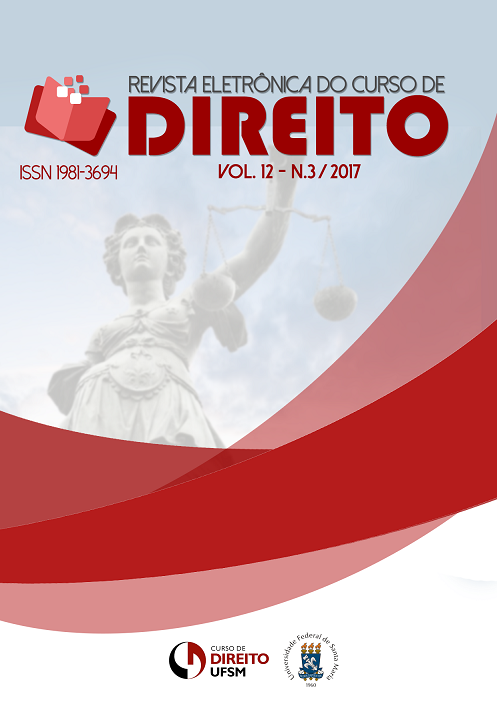NARRATIVE, FICCTION AND CRITICISM IN LEGAL SCIENCE
DOI:
https://doi.org/10.5902/1981369430486Keywords:
Legal science, Speech, Narrative and Law.Abstract
The present proposal takes as a basis for its elaboration the Closing Conference pronounced by the author in the International Private Law Congress held in the city of Punta del Este in the month of October 2013. Its purpose is to show an edge not too much traveled expressly neither in the Doctrine nor in the Jurisprudence of our country. Notwithstanding that the work is inficionado by the sample of a colloquial style, typical of the academic act for which it was thought, it covers aspects of relevance in the discourse of law, such as the possibility of considering it as a narrative field in which the different protagonists of a socio-juridical conflict that intervene in it, add their opposite stories, until the final consummation of the judicial decision by the Judge, also a singular species of narrator subject. The discourse of Law is discovered in this way, full of fictions that are inherent to it, and that in the Latin legal tradition, in a broad sense, have played a particularly important role. The protagonists assume the fiction "as if" it were the truth itself, when in reality, this can be an approved lie or a disguised truth. The crossing of borders between Narrative and Law, which is proposed as a category of specific analysis of legal criticism in the strict sense, shows the role of inventiveness and imagination to modify reality, through narrative legal discourse, as if it was a literary story, thus revealing the performative potential that it has, even more so if it is fictitious, despite the fact that many times it is intended to deny or at least dissimilate.
Downloads
References
ALFARO, C.; AGÜERO, C. Sobre las Ficciones en el discurso Jurídico –Penal de las Sentencias: El caso chileno. Revista de Estudios de la Justicia, No. 6, año 2005, Facultad de Derecho Universidad de Chile, p. 289-306.
CALVO GONZÁLEZ, J. La verdad de la verdad judicial. Construcción y régimen narrativo. Rivista Internazionale di Filosofía del Diritto, Giuffré, Milán 1999.
CÁRCOVA, C.M. Las Teorías Jurídicas Post Positivistas. Lexis Nexis Argentina, Buenos Aires, 2007.
FOUCAULT, M. La verdad y las forma jurídicas. Gedisa, Barcelona, 2003.
MARÍ, E. Derecho y Literatura, algo de lo que sí se puede hablar pero en voz baja. Doxa, No. 21,1998, p. 251-287.
MARÍ, E. La Teoría de las ficciones en Jeremy Bentham. Hachette, Buenos Aires, 1987.
MELIANTE L.; CASTRO, A. Una visión dialéctica del Derecho: Michel Villey. Hermnéutiva y Racionalidad.F.C.U., Montevideo, 1994, p. 61-88.
MELIANTE, L. Semiótica y Derecho penal. Aproximación interdisciplinaria y vinculación con la prática. Carlos Alvarez Editor, Montevideo, 2003.
MELIANTE, L. Derechos Humanos y Derecho Privado. Breve análisis crítico de y desde la ideología de la globalización. Revista Crítica de Derecho Privado, No. 3, Carlos Alvarez Editor, Montevideo, 2006, p. 15- 38.
MELIANTE, L. La crítica en el Derecho. Revista Crítica de Derecho Privado, No. 8, La Ley- Uruguay, 2011, p. 3-23.
MELIANTE, L. Acerca de la propuesta de Manuel Atienza sobre una Filosofía del Derecho para el mundo latino. Revista Crítica de Derecho Privado, No.9, La Ley- Uruguay, Montevideo, 2012, p. 4-25.
ORLER, J. El proceso judicial según Jorge Luis Borges. Crítica Jurídica, No. 35, UNAM, 2013, p.197-213.
TARANTILLA GARCÍA, R. La configuración narrativa en el proceso penal. Un análisis basado en corpus. Tesis Doctoral, junio 2011, Departament de Filología Hispánica. Universitat de Barcelona, p. 53- 130, Cap.II. Disponível em: < http://www.tdx.cat >.
Ross, A. La lógica de las normas. Tecnos, Madrid, 1971.
Downloads
Published
How to Cite
Issue
Section
License

Este obra está licenciado com uma Licença Creative Commons Atribuição-NãoComercial-SemDerivações 4.0 Internacional.








